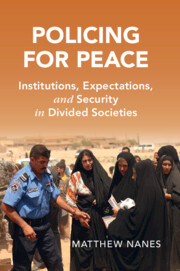Book contents
- Frontmatter
- Contents
- List of Figures
- List of Tables
- Preface
- Acknowledgments
- 1 Introduction: The Challenge of Institution-Building in Divided Societies
- 2 Power Sharing, Policing, and Peace
- 3 Sectarianism and Conflict in the Iraqi Police
- 4 Identity and Inclusion in the Israeli Police
- 5 Perceptions
- 6 Police Integration and Anti-Government Violence
- 7 Citizen Cooperation and Crime
- 8 Barriers to Integration
- 9 Conclusion: Peace-Building through Institutional Inclusion
- Appendix A Data and Methods
- Bibliography
- Index
- Seriespage
8 - Barriers to Integration
Published online by Cambridge University Press: 12 November 2021
- Frontmatter
- Contents
- List of Figures
- List of Tables
- Preface
- Acknowledgments
- 1 Introduction: The Challenge of Institution-Building in Divided Societies
- 2 Power Sharing, Policing, and Peace
- 3 Sectarianism and Conflict in the Iraqi Police
- 4 Identity and Inclusion in the Israeli Police
- 5 Perceptions
- 6 Police Integration and Anti-Government Violence
- 7 Citizen Cooperation and Crime
- 8 Barriers to Integration
- 9 Conclusion: Peace-Building through Institutional Inclusion
- Appendix A Data and Methods
- Bibliography
- Index
- Seriespage
Summary
Given the advantages of police integration, why do leaders not integrate the police in every divided society? I first explore the possibility that dominant-group civilians oppose integration, for example out of concern for a loss of jobs or fear that newly-integrated minorities will renew hostilities once integrated. Instead, I find that an overwhelming majority of Iraqi Shias and Israeli Jews support police integration. On the other hand, politicians and community leaders often oppose police integration for personal gain. Iraq, local politicians resist sectarian integration for fear that it will limit their opportunities to distribute jobs in the police as patronage in return for political support. In Israel, Arab community leaders who seek to create an independent Palestinian state view participation in the police as a dangerous normalization of the status quo. To discourage Arabs from joining the police, they portray participation in the police as collaboration with the enemy. Thus, implementation of police integration tends to be limited not by mass-opposition but by instrumental political concerns of political elites.
Keywords
- Type
- Chapter
- Information
- Policing for PeaceInstitutions, Expectations, and Security in Divided Societies, pp. 159 - 179Publisher: Cambridge University PressPrint publication year: 2021

